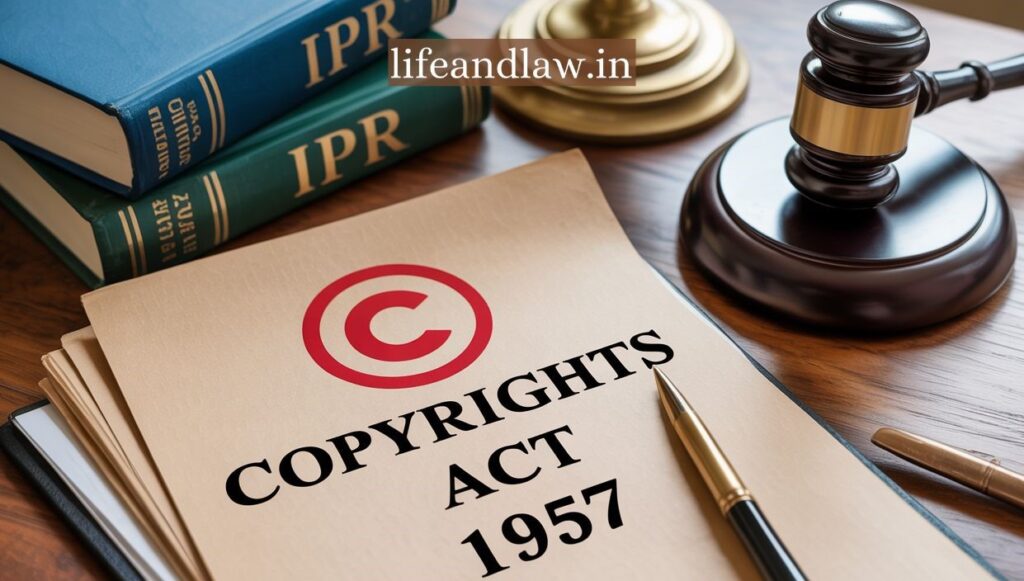Trending

Music, movies, and literature are critical components of a society’s cultural and intellectual growth. Artists, writers, and creators use their talent, effort, and inspiration to create outstanding works of art. However, in the digital age, the risk of their work being easily stolen or misappropriated has grown. This is why copyright law is so important in preserving the rights of creative professionals and ensuring they are fairly compensated for their efforts.
This article will provide information regarding copyright concepts and rules, as well as how they are enforced in the domains of music, cinema, and literature. In India, the Copyright Act of 1957 protects creative works such as literature, music, cinema, art, and computer software. This article examines how copyright protection works in the fields of music, film, and literature.
In India, copyright protects original literary, dramatic, musical, and creative works, as well as cinematograph films and sound recordings.
Conditions for Copyright:
For published works:
The book must have been originally published in India, or the author must be an Indian citizen.
For unpublished works:
The author must be an Indian citizen or a regular resident in India.
For architectural works:
The structure must be in India.
When copyright is not applicable:
If a cinematograph film or sound recording violates the copyright of another protected work, it will be denied copyright protection.
Copyright covers architectural designs but not construction methods.
Copyright refers to the exclusive right to execute or approve specific acts in connection with a work.
Key Rights:
For literary, dramatic, and musical works:
Reproduction, public dissemination, broadcasting, translation, and modification.
For computer programs:
Reproduction, sale, or rent.
For artistic works:
Making duplicates, public distribution, and broadcasting
For cinematograph films:
Creating copies and transmitting.
For sound recordings:
Creating copies and transmitting.
Music Copyright Rights and Restrictions
The lyricist owns the lyrics, the composer owns the compositions, and the producer owns the sound recordings, which must be used with their consent. It is prohibited to play music in public, use it in films or advertisements, download, share, or create remixes without consent.
Consequences of Music Piracy
Illegal downloading and piracy can result in legal consequences, such as imprisonment for up to 3 years or a ₹ 2 lakh fine.
Copyright in Films
A film is made up of several components, each with its own copyright: the writer owns the story and screenplay; the dialogue writer owns the dialogue; the composer and lyricist own the music and background score; the cinematographer owns the cinematography; and the performers own the performance rights. While editors have rights to their changes, the overall copyright usually belongs to the producer, who has final ownership.
Film Copyright Ownership and Usage
After production, copyright usually belongs to the producer or studio. Streaming platforms transfer rights through distribution agreements. Using any component of a film without authorization, whether sequences, excerpts, or songs, constitutes copyright infringement and is prohibited. Public showing requires a license, and piracy, which includes unauthorized downloading or dissemination, is punishable by penalties or imprisonment under the Cinematograph Act of 1952.
Authors have exclusive rights to their creative works, such as articles, poems, novels, and research. The original author’s permission is required for any translation, modification, or conversion of these works into audio or digital media. Editors and compilers obtain specific rights to their contributions.
When authors assign copyright to publishers, the latter get the right to print, distribute, and sell the work. However, for adaptations or digital publishing, publishers must obtain the author’s specific permission. When signing contracts, authors should make it clear which rights are transferred.
Unauthorized copying, distributing, or publishing of literary works constitutes copyright infringement. Plagiarism, or using someone else’s work without permission or credit, can result in financial harm and legal penalties, such as imprisonment for up to 3 years or a ₹ 2 lakh fine.
Copyright law protects the intellectual property of musicians, filmmakers, and writers by guaranteeing them exclusive rights to their work. It assures fair acknowledgment and recompense, and makes unlawful use, replication, or distribution a criminal violation. With the development of digital piracy, the enforcement of these rules is more critical than ever in preserving creativity and protecting the rights of original authors.
This article was written by Adv. Abdul Mulla, a practitioner dedicated to promoting legal awareness in everyday life. For professional legal advice and support, you can reach him at http://www.lifeandlaw.in or http://www.asmlegalservices.in.
Adv. Abdul Mulla (Mob. No. 937 007 2022) is a seasoned legal professional with over 18 years of experience in advocacy, specializing in diverse areas of law, including Real Estate and Property Law, Matrimonial and Divorce Matters, Litigation and Dispute Resolution, and Will and Succession Planning. read more….
Copyright BlazeThemes. 2025